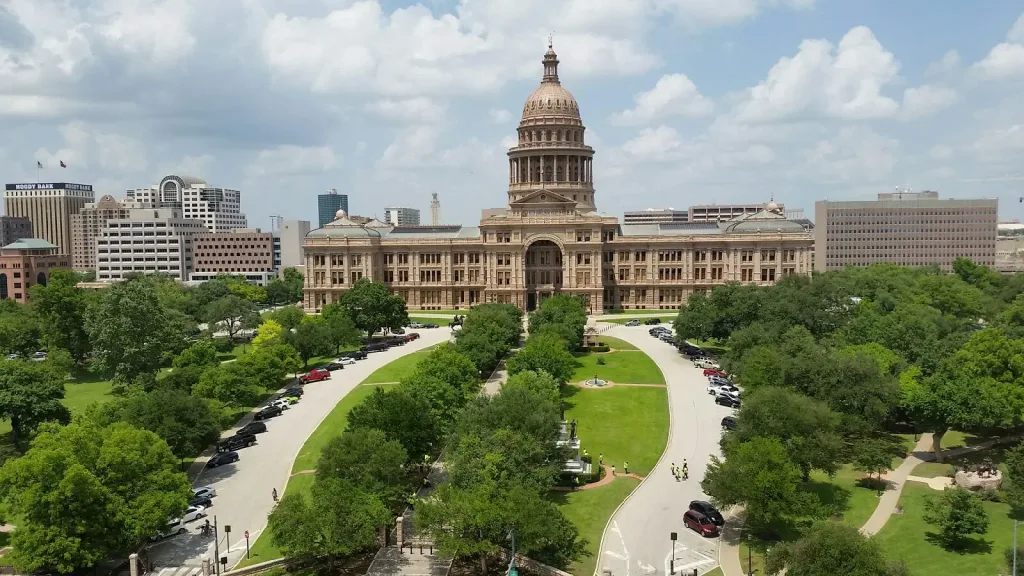
Return to August 2021 newsletter
Around the Texas Capitol:
Summertime special session drama continues, and more
By Lauren Fairbanks, Shayne Woodard and J Pete Laney
TAD Governmental Affairs
In our July report, the Texas Legislature had just gaveled in for the first called special session of the 87th Legislature and enough House Democrats left Austin for Washington, D.C., to break the quorum needed for the House to do business. The Democrats left to prevent action on an election/voting bill they objected to that they had prevented from passing during the regular session.
The House did not have a quorum through the end of the special session, so it was unable to conduct business or hold committee hearings. As a result, although the Texas Senate met and passed bills, the special session ultimately ended without full passage of any of the 11 items Gov. Greg Abbott had included on the agenda.
Immediately after the first special session ended, the second started on Aug. 7. This time, the agenda included the original 11 items and an additional six items: the appropriation of health-related federal COVID relief funds, COVID-related education issues, radioactive waste, employment, primary elections, and legislative quorum requirements.
As of this writing, enough House Democrats are still absent from the proceedings to again keep the House from conducting business. House Speaker Dade Phelan has signed civil arrest warrants for the missing Democrats, and on Aug. 12 Texas law enforcement was deputized to track down the absent members and bring them to the Capitol.
We’ll be watching to see if enough return to make progress in passing and sending to the governor any of the 17 items on the session agenda. The 30-day second special session expires Sept. 5. Abbott has vowed to continue to call special sessions until his agenda is approved.
On the agenda, the most significant issue is restoring funding for the legislative branch of government, known as Article X for its designation in the state budget. Article X funds House and Senate staffers and those working in nonpartisan legislative agencies. More than $410 million was allocated in the 2022-23 fiscal budget before Abbott vetoed it in retribution for Democrats walking out of the regular session, killing his priority election/voting bill. Abbott, Lt. Gov. Dan Patrick, Speaker Phelan, Senate Finance Chair Jane Nelson and House Appropriations Chair Greg Bonnen have announced an additional month of funding for the Texas Legislature. This temporary restoration will cover legislative staff salaries and benefits until funding can be fully restored through the appropriations process in the special session.
More highlights and a preview of the 2022 election cycle are included below.
AROUND AUSTIN
July 12. Gov. Abbott sent a letter to the Public Utility Commission of Texas (PUC) directing it and Electric Reliability Council of Texas (ERCOT) to take immediate actions to increase power generation capacity and ensure reliability of the Texas power grid. The letter specifically calls for the following actions:
- Streamline incentives within the ERCOT market to foster the development and maintenance of adequate and reliable sources of power, like natural gas, coal and nuclear power;
- Allocate reliability costs to generation resources that cannot guarantee their own availability, such as wind or solar power;
- Instruct ERCOT to establish a maintenance schedule for natural gas, coal, nuclear and other non-renewable electricity generators to ensure that there is always an adequate supply of power on the grid to maintain reliable electric service for all Texans; and
- Order ERCOT to accelerate the development of transmission projects that increase connectivity between existing or new dispatchable generation plants and areas of need.
In response, ERCOT sent a letter to the governor detailing the strategies it has taken to achieve those goals. Legislators also have been analyzing the reliability of the state’s power grid following the passage of reform measures during the regular session. The Senate Business and Commerce committee held a hearing on July 13 to discuss unexpected power plant outages in June, lingering issues with the state’s energy infrastructure from February’s deadly winter storm and plans to implement legislation that lawmakers recently approved. The committee heard invited testimony only from the ERCOT interim president and the three-member PUC board. All four regulators replaced officials ousted following the winter storm in February.
Following the hearing, ERCOT released a plan to further ensure grid reliability and improve communication. The “Roadmap to Improving Grid Reliability” is a comprehensive plan that addresses operational improvements to the Texas power grid, including important legislative changes, objectives outlined in the governor’s July 6 letter and other reforms.
July 17. Abbott continues to make border security his top priority ahead of the 2022 elections. Abbott hosted Florida Gov. Ron DeSantis for a border security briefing in Del Rio, Texas. At the briefing, Abbott provided an update on the state’s efforts to combat the influx in the smuggling of drugs, weapons and other contraband into the state. Abbott also thanked DeSantis for answering the call to the Emergency Management Assistance Compact by deploying law enforcement officers from Florida to assist in border security efforts in Texas.
July 21. Abbott appointed Rep. Cody Harris (R-Palestine) to the Southwestern States Water Commission for terms set to expire Feb. 1, 2025. The commission will work with neighboring states to identify and develop sources and methods of augmenting water supplies on a regional basis after existing water supplies are fully committed. Harris owns and operates Liberty Land & Ranch in Palestine, a statewide real estate brokerage firm. He is currently vice chair of the Texas House Committee on Natural Resources. He is a long-time member of the Texas Association of Realtors, Texas Farm Bureau and Texas Agricultural Lifetime Leadership Program (TALL).
July 28. Abbott issued an executive order restricting ground transportation of migrants who pose a risk of carrying COVID-19 into Texas communities. The executive order also directed the Texas Department of Public Safety (DPS) to stop any vehicle upon reasonable suspicion of such violation and reroute such vehicles back to its point of origin or a port of entry. DPS also has the authority to impound a vehicle that violates the executive order.
U.S. Attorney General Merrick Garland sent a letter to Abbott the following day urging him to rescind the order and threatening legal action. Abbott responded with a letter of his own. Ultimately, Garland and the U.S. Department of Justice filed a suit asking a federal judge to block Abbott’s order. The lawsuit claims that if migrants are not allowed to be transported by volunteers or contractors, they would have to be confined to immigration facilities where there would not be enough space for every migrant. Abbott issued a statement in response to the lawsuit. This is a developing story.
July 29. Abbott issued an Executive Order (GA-38) combining several existing COVID-19 executive orders to promote statewide uniformity and certainty in the state’s COVID-19 response. Abbott said, “Today’s executive order will provide clarity and uniformity in the Lone Star State’s continued fight against COVID-19. The new Executive Order emphasizes that the path forward relies on personal responsibility rather than government mandates. Texans have mastered the safe practices that help to prevent and avoid the spread of COVID-19. They have the individual right and responsibility to decide for themselves and their children whether they will wear masks, open their businesses, and engage in leisure activities. Vaccines, which remain in abundant supply, are the most effective defense against the virus, and they will always remain voluntary – never forced – in the State of Texas.”
August 2. Comptroller Glenn Hegar announced his agency will operate a newly created Broadband Development Office (BDO). The BDO will award grants, low-interest loans and other financial incentives to internet service providers who expand access to broadband service in underserved areas. Hegar will serve as chairman of a 10-member board of advisors that will guide the new office. The office, established by House Bill 5 during the 87th Legislature, will do the following:
- Create a broadband map indicating areas eligible for financial assistance;
- Set an effective threshold speed for broadband service in those underserved areas at 25 megabits per second (Mbps) download and 3 Mbps upload;
- Create and update a state broadband plan;
- Engage in outreach to communities regarding the expansion and adoption of broadband service and the programs administered by the BDO; and
- Serve as the state’s subject matter expert for federal funding to help local governments.
ELECTION ROUNDUP
Texas Congressional District 6 Special Election
The runoff election to fill the 6th Congressional District seat recently vacated by the late Congressman Ron Wright (R-Fort Worth) was held July 27. Republicans Susan Wright and Jake Ellzey faced off after narrowing the field earlier this year. Ellzey, a state representative from Waxahachie, beat Wright, a member of the State Republican Executive Committee and Ron Wright’s widow. Ellzey won with 53% of the vote to 47% for Wright. Ellzey was sworn into Congress four days after winning the election.
Texas House District 10 Special Election
Abbott announced Aug. 31 as the special election date for the HD 10 seat recently vacated by now-Congressman Jake Ellzey. Early voting will begin Aug. 23. HD 10 is a Republican-held seat covering largely rural areas south and southeast of Dallas. Seven candidates will be on the ballot:
- Independent Scott Goodwin from Waxahachie;
- Republican Kevin Griffin, a general manager from Midlothian;
- Republican Brian Harrison, a small businessman and former Health and Human Services official in the Trump administration who finished fourth in the May special election for Congressional District 6;
- Republican Susan Hayslip, a Waxahachie lawyer;
- Democrat Pierina Otiniano, an Ennis immigration attorney;
- Libertarian Matt Savino, of Seven Points;
- Republican Clark Wickliffe, a Realtor and city council member from Midlothian; and
- Republican John Wray from Waxahachie, who previously held the seat but did not seek reelection in 2020.
Return to August 2021 newsletter


